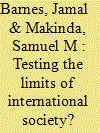| Srl | Item |
| 1 |
ID:
186993


|
|
|
|
|
| Summary/Abstract |
When Australia reneged on a AUD$90 billion submarine contract with France in 2021 as it joined AUKUS, a new trilateral military partnership between Australia, the UK and the US, it was accused of lying and breaching France's trust. This perceived act of betrayal not only led to a deterioration in the diplomatic relationship between Australia and France, but it also drew attention to the consequences of violating the norm of pacta sunt servanda—agreements must be kept. Although it is recognized that breaches of trust undermine relationships, what has been underexplored is how a violation of norms can also undermine the presumption of trust in international society more broadly. Focusing on how Australia broke its contract with France after it joined AUKUS, this article argues that Australia's conduct not only harmed its relationship with France, but it also led the European Union (EU) to raise questions about how much to trust AUKUS partners as it engages in the Indo-Pacific region. It posits that adherence to international norms is important for developing trust between states in international society and has the potential to facilitate cooperation and enhance security in the complex Indo-Pacific region and beyond.
|
|
|
|
|
|
|
|
|
|
|
|
|
|
|
|
| 2 |
ID:
185561


|
|
|
|
|
| Summary/Abstract |
The outbreak of COVID-19 in early 2020 provided cover for some states to take strict and hostile measures against refugees and asylum seekers, thereby privileging self-regarding over other-regarding or cosmopolitan-oriented policies. The hostile measures, which have included detentions, pushbacks and other refugee deterrence actions not only appeared to shake the refugee system, but they increased the vulnerability of asylum seekers and refugees who continued to be exposed to torture, drownings at sea, trafficking and sexual violence. This development, which included a fine-tuning of some measures that had been hatched before the emergence of COVID-19, appeared to set back efforts to nurture the bonds of global human solidarity and expand moral and ethical boundaries beyond state borders. However, the international refugee regime continues and is supported by many states and other international actors that seek to emphasise cosmopolitan and other-regarding policies. The resilience of the refugee system underlines the fact that international society has a practical and moral basis to challenge exclusionist policies towards asylum seekers and refugees, prevent future harm that might result from asylum deterrence policies and develop more humane forms of international refugee governance.
|
|
|
|
|
|
|
|
|
|
|
|
|
|
|
|